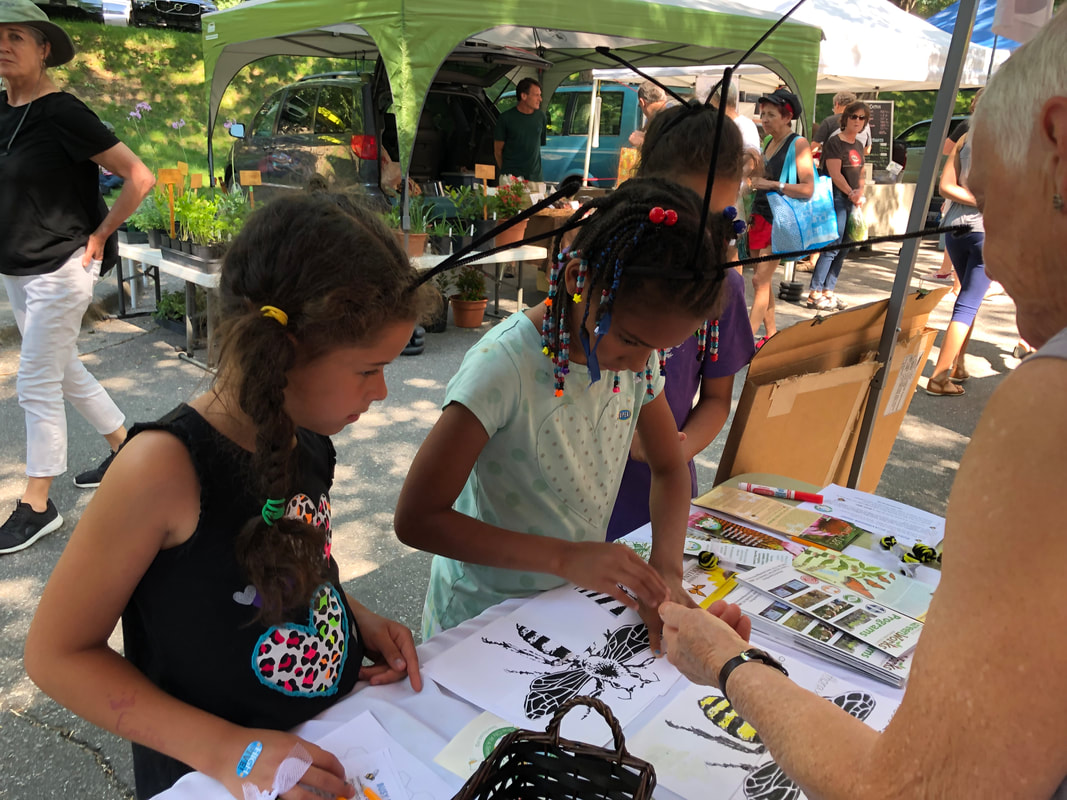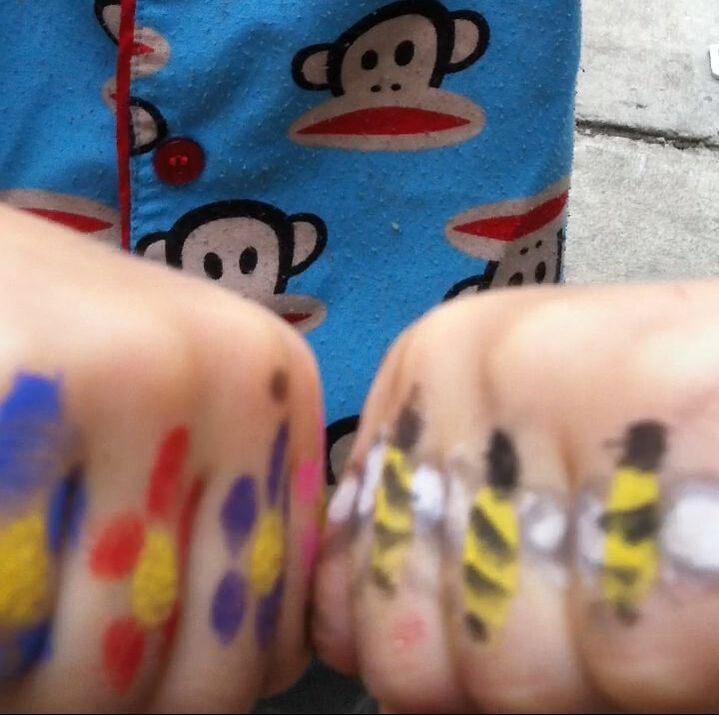
Most Bee City USA affiliates regularly table at events, especially farmers’ markets. These smiling volunteers (“pollenteers”) stand ready to share literature, collect emails for newsletter lists, and answer questions about Bee City, pollinators, and more.
At Bee City USA, we hope this blog helps you better prepare volunteers to be pollinator advocates at events.
Although we’re sure many of you already have some great tabling tricks up your sleeves, coaxing people into a conversation can sometimes pose a challenge. Perhaps you’re new to tabling, or are trying to brainstorm a solution to a tricky scenario, or are simply looking for fresh ideas. Wherever you are in your tabling journey, here are some tips to help make your next event your most productive yet!
Setting the Table
Your table could have a plate or basket filled with colorful foods reliant on pollinators, contrasted with a bland-looking plate or basket filled with a variety of wind-pollinated grains. A lovely vase of diverse, native flowers is always a nice touch—as well as a recommended regional plant list to share with visitors. You can also demonstrate the amazing diversity of the world’s 20,000 bee species with laminated posters. Volunteers could provide a scavenger hunt for children to track down food and other products pollinated by an animal. (Instructions and supplies for a scavenger hunt, as well as artwork for posters for farmers markets, are available here.)
Messages That Bring People to Your Table
What should volunteers say to entice the waves of passers-by to their booth? Here are some simple messages that have worked for us in Asheville, North Carolina, home of the first Bee City USA.
At Bee City USA, we hope this blog helps you better prepare volunteers to be pollinator advocates at events.
Although we’re sure many of you already have some great tabling tricks up your sleeves, coaxing people into a conversation can sometimes pose a challenge. Perhaps you’re new to tabling, or are trying to brainstorm a solution to a tricky scenario, or are simply looking for fresh ideas. Wherever you are in your tabling journey, here are some tips to help make your next event your most productive yet!
Setting the Table
Your table could have a plate or basket filled with colorful foods reliant on pollinators, contrasted with a bland-looking plate or basket filled with a variety of wind-pollinated grains. A lovely vase of diverse, native flowers is always a nice touch—as well as a recommended regional plant list to share with visitors. You can also demonstrate the amazing diversity of the world’s 20,000 bee species with laminated posters. Volunteers could provide a scavenger hunt for children to track down food and other products pollinated by an animal. (Instructions and supplies for a scavenger hunt, as well as artwork for posters for farmers markets, are available here.)
Messages That Bring People to Your Table
What should volunteers say to entice the waves of passers-by to their booth? Here are some simple messages that have worked for us in Asheville, North Carolina, home of the first Bee City USA.
- FOR ADULTS: “Hi! We’re here today talking about pollinator conservation,” or “Would you like to take our pollinator protection pledge?”
- FOR CHILDREN: “Would you like to go on a scavenger hunt or make a bee?” or “Would you like to have flower and bee knuckles?” (See below. You can put your knuckles together to feed the bees flowers!)

Educating Children Quickly
Once you’ve successfully piqued a child’s interest, what can you say so they leave knowing a little more about pollinators? Here are some ideas:
Once you’ve successfully piqued a child’s interest, what can you say so they leave knowing a little more about pollinators? Here are some ideas:
- “Do you know what bees eat?” (Nectar and pollen.)
- “What can you do to help bees?” (Plant flowers.)
- “What’s your favorite fruit? Can you guess who pollinates it?” (Here’s a short list of foods and their pollinators you can check for the answer.)
- Do you know what bees and butterflies use their antennae for? (To smell nectar.)
- Can you name three kinds of pollinators? (Bees, butterflies, moths, bats, wasps, hummingbirds, beetles, flies…)
Engaging New Volunteers & Supporters
Some visitors of all ages really want to talk; what should the volunteers do? Here are some ideas:
- Ask about their pollinator gardens. (Suggest they certify it through Xerces’ Bring Back the Pollinators Pledge or a local certification program.)
- Tell them about upcoming events. (Have a flyer to pass out.)
- Ask if they would like to join the e-news list. (Set a number goal for the day to motivate volunteers.)
- Ask if they would like to volunteer to help with habitat enhancement, or tabling at events, etc.
- Show them the recommended native plant and tree list for the local area. (Refer them to webpage for downloadable list.)
- Prominently display an attractive donation jar. (Those donations could cover the direct expenses of the day.)
The best reward is when somebody comes to your table to tell you that talking with you before has stuck with them! Maybe they planted native plants because they visited your table last year, or attended one of your events and stopped using pesticides as a result. Regardless, by tabling, you are doing the work necessary to encourage individuals to do what they can to conserve pollinators. Thank you!
An initiative of the Xerces Society, Bee City USA’s conservation work is powered by our donors. Your tax deductible donation will help us to protect the life that sustains us.




